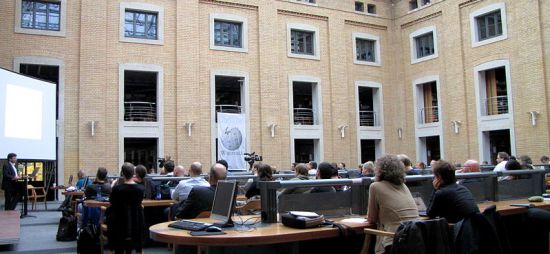
[Wir danken Christian Pentzold für die Erlaubnis, aus seiner Zusammenfassung der CPOV-Tagung eine längere Passage übernehmen zu dürfen! P.H.]
Peter Haber, researcher at the seminar for general modern history, University of Basel, presented some initial results from a research seminar he gave at the University of Vienna which was titled: Source critique in Wikipedia. A research report. His presentation dealt with the online encyclopedia from a historiographic point of view. The general direction of the academic ‘experiment‘ addressed the question how Wikipedia functions with a special focus on articles on historic and historical subjects.
The key term Peter Haber set out from was the notion of ‘historical source critique‘ as the core competence for historians. As such it forms part of the elementary historic training and centers on the handling and scrutinizing of historic material. With his group of research students, Haber took this concept to inform the analysis of some Wikipedia articles in the English- and German-language about historic topics.
The investigation sampled entries on historical terms, epochs, events, persons, and methods. The leading assumption was that an inter-linguistic (and thus inter-wiki) comparison would shed light on their varying structures and quality. As criteria for article quality they took the entry’s correctness, objectivity, formality, references, currency, orthography, readability, comprehensibility, illustrations and the existence of multiple points of view. As a reference point they choose the respective Brockhaus entry.
On the one hand, their analyses sustain the well-known fact that article length does not correlate with quality. However, on balance, the English entries are longer and better structured. On the other, the results point to the tendency that although the articles usually compile long lists of literature, they nevertheless do not make active use of this body of sources as references and they include a fair amount of trivia and varia about historic persons. Moreover, Haber’s and his research group’s examination of articles like ‚Mexican revolution‘, ‚French revolution‘, or ‘classical antiquity’ show that small clusters of ‘power users’ dominate the editing process of single articles or sets of articles. All of these insights led them to conclude that the common suggestion to take Wikipedia entries as a starting point to gain some first knowledge about an unknown topic is a myth. Especially the articles trying to tackle complex issues fail to present up-to-date material and have no clear structure. Therefore, such entries, Haber argues, are no viable point of entrance to such fields of knowledge.
[x-posted from www.cpov.de]
[Bild: Ziko van Dijk auf Wikimedia Commons]
